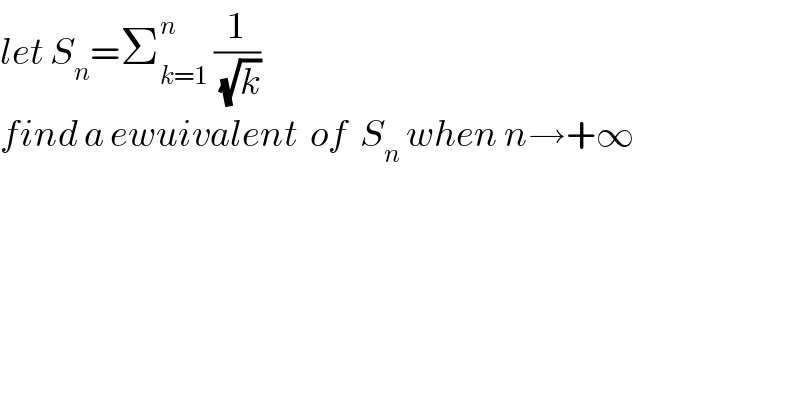Question Number 42096 by abdo.msup.com last updated on 17/Aug/18

$${let}\:{S}_{{n}} =\sum_{{k}=\mathrm{1}} ^{{n}} \:\frac{\mathrm{1}}{\:\sqrt{{k}}} \\ $$$${find}\:{a}\:{ewuivalent}\:\:{of}\:\:{S}_{{n}} \:{when}\:{n}\rightarrow+\infty \\ $$
Commented by maxmathsup by imad last updated on 18/Aug/18
![the sequence ((1/( (√k))))_(k≥1) is decreasing so ∫_k ^(k+1) (dt/( (√t))) ≤ (1/( (√k))) ≤ ∫_(k−1) ^k (dt/( (√t))) ⇒ Σ_(k=1) ^n ∫_k ^(k+1) (dt/( (√t))) ≤ Σ_(k=1) ^n (1/( (√k))) ≤ Σ_(k=1) ^n ∫_(k−1) ^k (dt/( (√t))) ⇒ ∫_1 ^(n+1) (dt/( (√t))) ≤ S_n ≤ ∫_0 ^n (dt/( (√t))) ⇒ [2(√t)]_1 ^(n+1) ≤ S_n ≤[2(√t)]_1 ^n ⇒ 2(√(n+1)) −2 ≤ S_n ≤ 2(√n)⇒ ((2(√(n+1)) −2)/(2(√n))) ≤ (S_n /(2(√n))) ≤1 ⇒ (√(1+(1/n))) −(1/( (√n))) ≤ (S_n /(2(√n))) ≤ 1 but we have lim_(n→+∞) (√(1+(1/n)))−(1/( (√n))) =1 ⇒ S_n ∼ 2n (n→+∞)](https://www.tinkutara.com/question/Q42116.png)
$${the}\:{sequence}\:\left(\frac{\mathrm{1}}{\:\sqrt{{k}}}\right)_{{k}\geqslant\mathrm{1}} {is}\:{decreasing}\:\:\:{so} \\ $$$$\int_{{k}} ^{{k}+\mathrm{1}} \:\:\frac{{dt}}{\:\sqrt{{t}}}\:\leqslant\:\frac{\mathrm{1}}{\:\sqrt{{k}}}\:\:\leqslant\:\:\int_{{k}−\mathrm{1}} ^{{k}} \:\:\frac{{dt}}{\:\sqrt{{t}}}\:\Rightarrow\:\sum_{{k}=\mathrm{1}} ^{{n}} \int_{{k}} ^{{k}+\mathrm{1}} \:\:\frac{{dt}}{\:\sqrt{{t}}}\:\leqslant\:\sum_{{k}=\mathrm{1}} ^{{n}} \:\:\frac{\mathrm{1}}{\:\sqrt{{k}}}\:\:\leqslant\:\sum_{{k}=\mathrm{1}} ^{{n}} \int_{{k}−\mathrm{1}} ^{{k}} \:\:\frac{{dt}}{\:\sqrt{{t}}}\:\Rightarrow \\ $$$$\int_{\mathrm{1}} ^{{n}+\mathrm{1}} \:\frac{{dt}}{\:\sqrt{{t}}}\:\:\leqslant\:{S}_{{n}} \leqslant\:\:\int_{\mathrm{0}} ^{{n}} \:\:\frac{{dt}}{\:\sqrt{{t}}}\:\:\:\Rightarrow\:\:\left[\mathrm{2}\sqrt{{t}}\right]_{\mathrm{1}} ^{{n}+\mathrm{1}} \:\leqslant\:{S}_{{n}} \leqslant\left[\mathrm{2}\sqrt{{t}}\right]_{\mathrm{1}} ^{{n}} \:\Rightarrow \\ $$$$\mathrm{2}\sqrt{{n}+\mathrm{1}}\:\:−\mathrm{2}\:\leqslant\:{S}_{{n}} \:\:\leqslant\:\:\mathrm{2}\sqrt{{n}}\Rightarrow\:\:\:\frac{\mathrm{2}\sqrt{{n}+\mathrm{1}}\:−\mathrm{2}}{\mathrm{2}\sqrt{{n}}}\:\leqslant\:\:\frac{{S}_{{n}} }{\mathrm{2}\sqrt{{n}}}\:\leqslant\mathrm{1}\:\Rightarrow \\ $$$$\sqrt{\mathrm{1}+\frac{\mathrm{1}}{{n}}}\:−\frac{\mathrm{1}}{\:\sqrt{{n}}}\:\leqslant\:\:\frac{{S}_{{n}} }{\mathrm{2}\sqrt{{n}}}\:\:\leqslant\:\mathrm{1}\:\:\:{but}\:{we}\:{have}\:{lim}_{{n}\rightarrow+\infty} \:\sqrt{\mathrm{1}+\frac{\mathrm{1}}{{n}}}−\frac{\mathrm{1}}{\:\sqrt{{n}}}\:\:=\mathrm{1}\:\Rightarrow \\ $$$${S}_{{n}} \sim\:\mathrm{2}{n}\:\:\:\:\:\left({n}\rightarrow+\infty\right) \\ $$$$ \\ $$
Commented by maxmathsup by imad last updated on 18/Aug/18

$${S}_{{n}} \sim\:\mathrm{2}\sqrt{{n}}\:\:\:\:\left({n}\rightarrow+\infty\right) \\ $$
